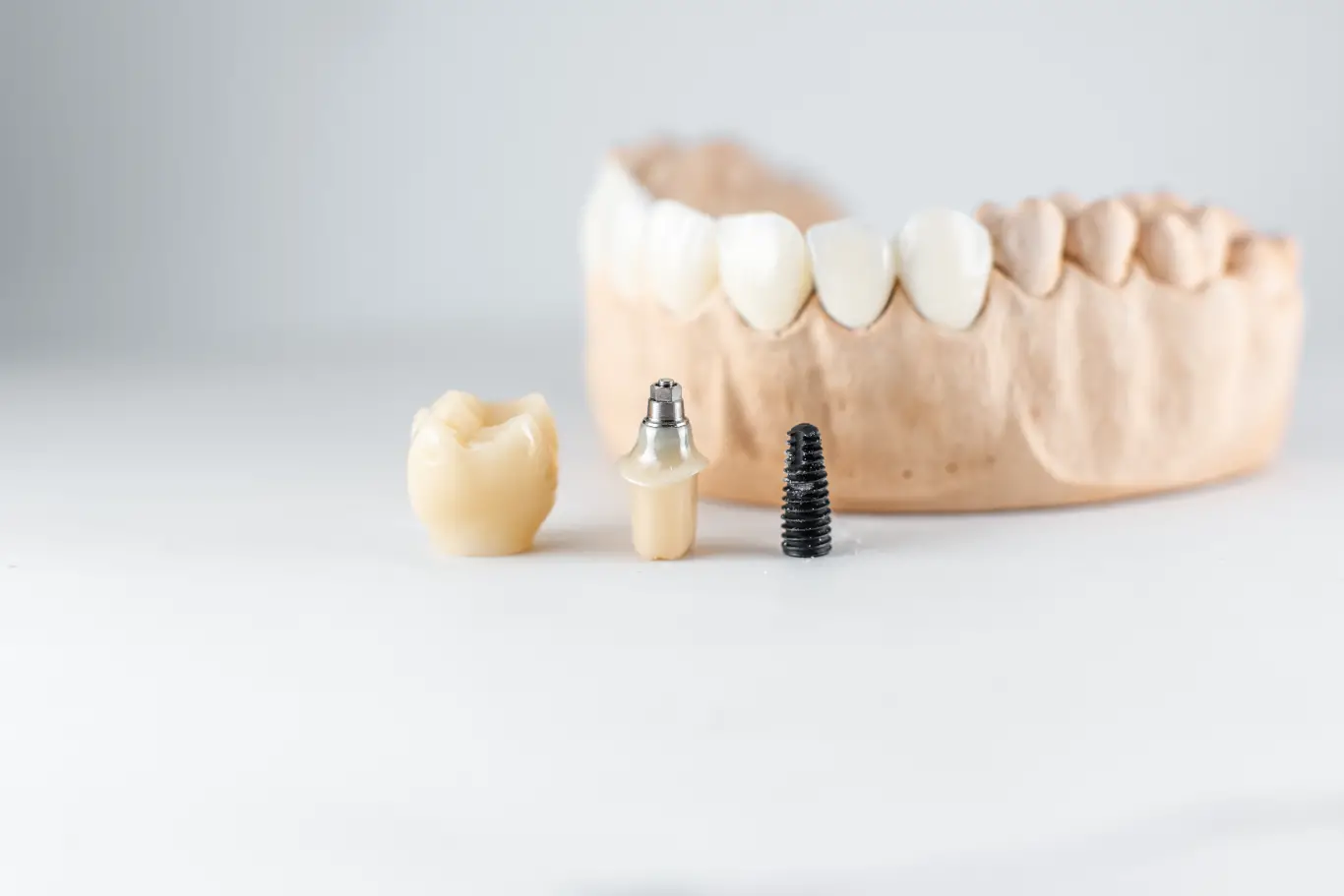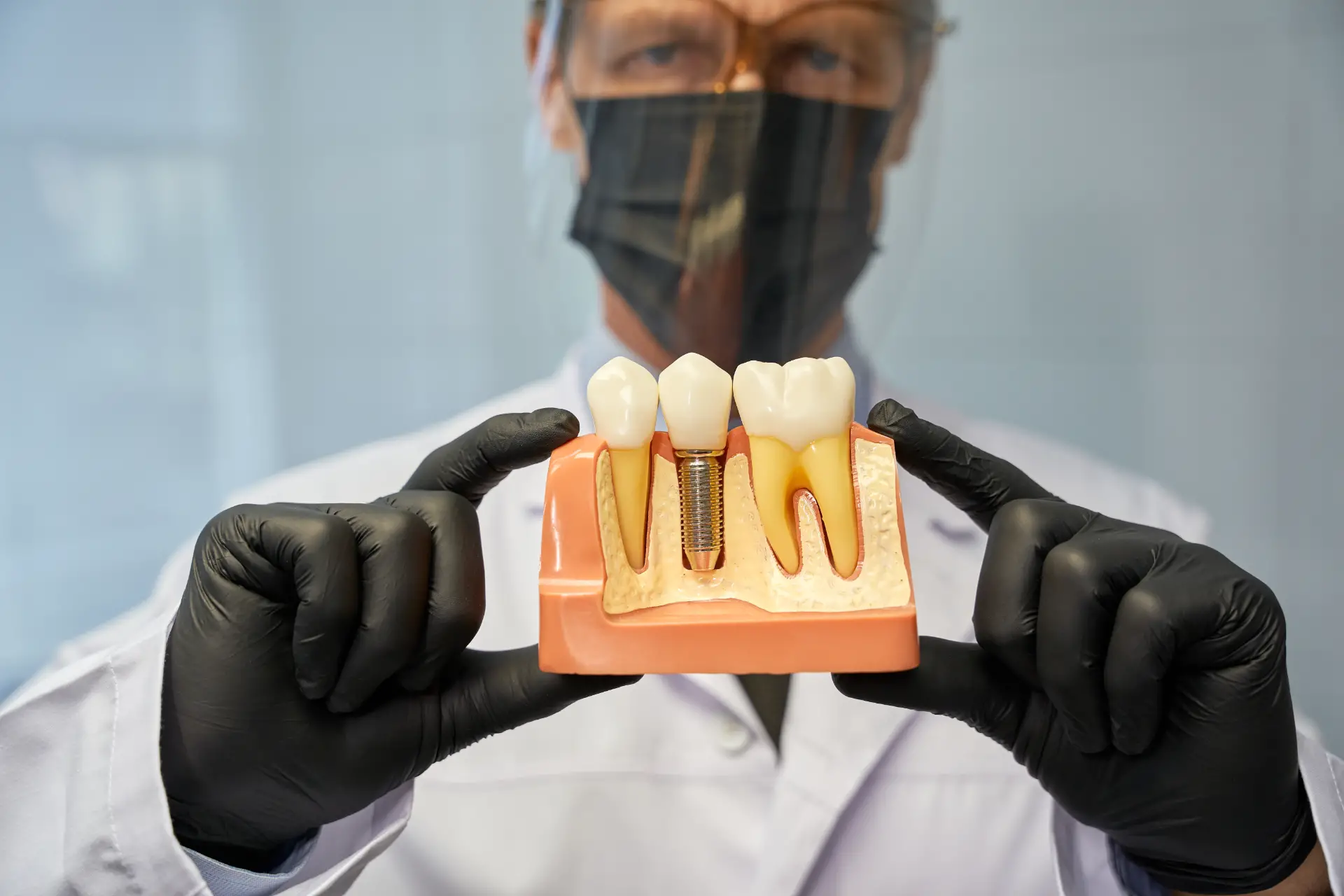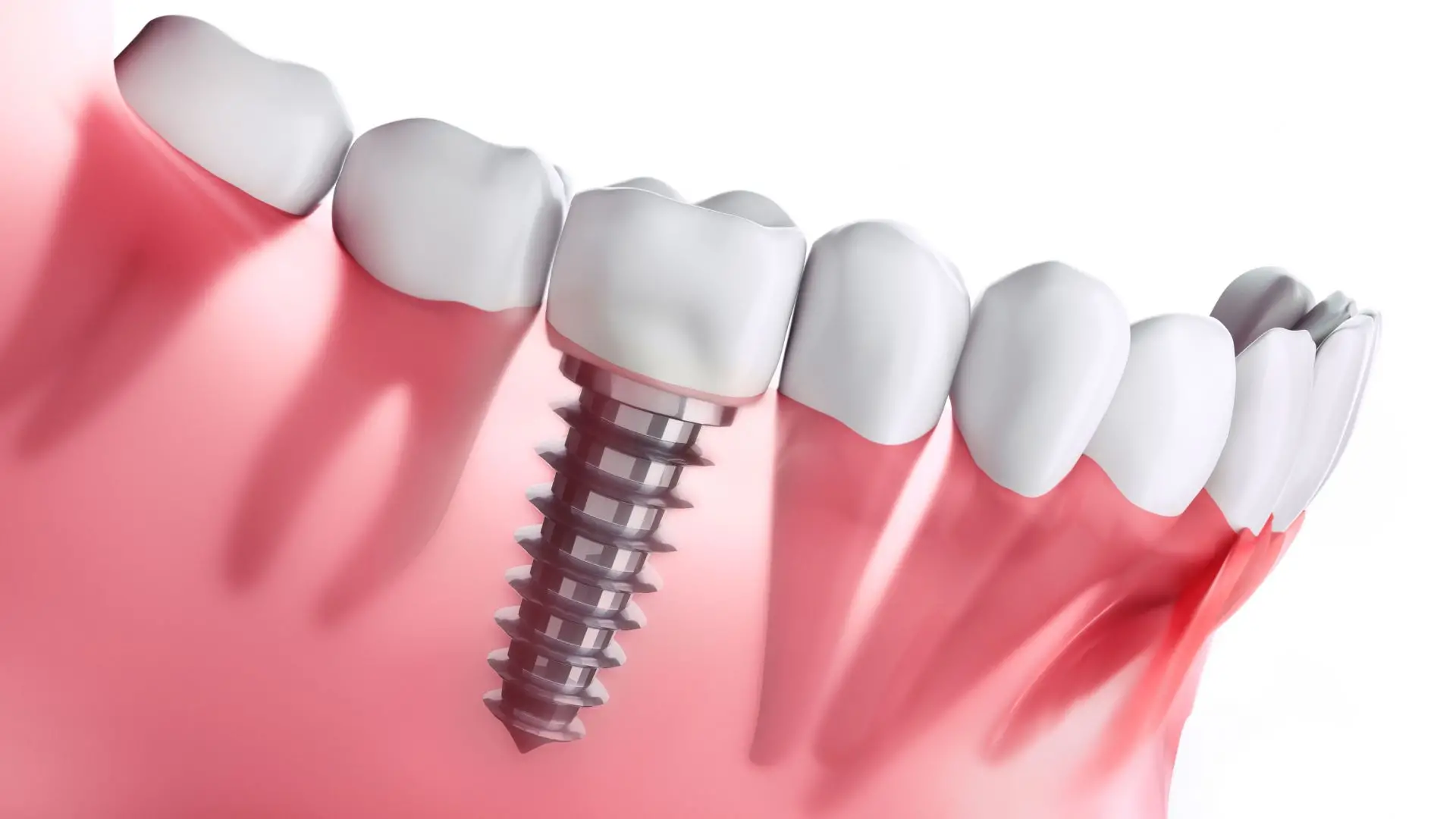On average, dental implants can last a lifetime with the implant post potentially never needing replacement, while the crown may require changing every 10 to 15 years.
It’s commonly thrown out there that dental implants are considered to be “permanent” solutions for replacing missing or damaged teeth but is that really true? You’re probably interested in knowing how long your dental implants will really last and how they compare to the lifetime of a similar alternative, like dentures.
In this article, you’ll learn not only about the average lifespan of dental implants but also the factors that affect their durability. We’ll explore everything from daily care routines to the impact of your overall health on the longevity of your implants. Plus, you’ll discover how to maximize the life of your dental investment with practical tips and professional advice.
Imagine regaining your perfect smile with dental implants, only to worry about when they might need replacement. It’s a common concern that we hear often. However, with the right information and care, your dental implants can last decades, providing a long-term solution for missing teeth.
Image Dental seeks to help patients feel confident going into their dental implant surgery by giving them realistic expectations of how long their implants will last. It’s also important to know how to even make your dental implants last longer.
Key Takeaways
- Dental implants can last a lifetime for the post, but the crown might need a swap every 10-15 years. Keeping them clean and visiting the dentist helps a lot.
- If you smoke or eat lots of sugary foods, your implants might not last as long. Quitting smoking and eating healthy foods can keep your implants strong.
- Picking a skilled dentist and high-quality implants makes a big difference. Better materials and a pro doing the work mean your implants will stick around longer.
- Taking care of your implants right after surgery is super important. Following your dentist’s advice helps your mouth heal faster and keeps your implants secure.
- Comparing implants to dentures or bridges? Implants win on lasting longer, looking better, and being easier to take care of. They might cost more upfront but save you money and hassle in the long run.

The Lifespan of Dental Implants
When considering dental implants, one of the most common questions is: “How long do they last?” The answer is both encouraging and dependent on various factors.
Generally speaking, with proper care and maintenance, the metal post—or implant—can potentially last a lifetime. However, the crown (the tooth-like part) typically has a lifespan ranging from 10 to 15 years before it may require replacement due to wear and tear.
According to an article published by the American Academy of Implant Dentistry, dental implants boast an impressive success rate of over 95%. This high percentage reflects not only their reliability but also their durability when properly cared for by patients. It’s important to note that while the titanium post can remain intact indefinitely within your jawbone—the crown atop will endure daily functions like chewing which gradually wears it down.
- Metal Post: Can last a lifetime with diligent oral hygiene and regular check-ups.
- Crown: On average needs replacement every 10-15 years due to normal wear.
Factors Affecting Implant Longevity
Dental implants are a popular and effective solution for replacing missing teeth, offering both functionality and aesthetic appeal. However, the longevity of dental implants can be influenced by several factors. Understanding these can help ensure your investment lasts as long as possible.
1. Oral Hygiene Practices
Maintaining excellent oral hygiene is paramount for the durability of dental implants. Regular brushing and flossing remove plaque and prevent gum disease, which can compromise implant stability.
2. Lifestyle Choices: Smoking and Diet
Smoking and diet impact implant longevity. Smoking can inhibit healing post-surgery and decrease blood flow, compromising the osseointegration process. A balanced diet, rich in vitamins and minerals, supports overall health, including that of your gums and jawbone, ensuring a stable base for your implants.
- Smoking: Smoking significantly increases the risk of implant failure due to its impact on blood flow and healing capacity in the gums. Quitting smoking is highly recommended to improve overall success rates.
- Diet: A balanced diet supports immune health and promotes healing post-surgery, while hard or sticky foods should be avoided to protect your new implant from undue stress.
3. Precision of Implant Placement
The skill level of your dentist plays a critical role in ensuring that an implant is placed correctly within your jawbone—this precision affects how well it integrates with bone tissue over time. Choosing a reputable dental professional with extensive experience in performing dental implant procedures is essential for optimal outcomes.
4. The Quality of Materials Used
Dental implants are made from various materials such as titanium or zirconia; each has its own set of benefits regarding biocompatibility, strength, and aesthetics. The type and the quality of materials contribute significantly to the long-term success rate. It’s important to discuss options with your dentist.
5. Overall Health and Bone Quality
Your overall health influences implant success. Conditions like diabetes or osteoporosis can affect healing and bone density, impacting the stability of the implant. Adequate bone density is required to support the implant; in some cases, bone grafting may be necessary before implantation.
6. Immediate Post-Operative Care
Initial care is critical. Following your surgeon’s post-operative care instructions can significantly affect the healing process and implant success. Activities that put undue pressure on the implant, like chewing hard foods or using it as a tool, should be avoided.
By paying attention to these factors, you can significantly influence the longevity of your dental implants. Adopting a proactive approach to oral health and following your dental professional’s advice can help you enjoy a lasting smile. Let’s delve deeper into understanding dental implants and how they work, ensuring you’re fully equipped to take care of your new smile.

Maintaining Your Dental Implants
Ensuring the longevity and health of your dental implants is crucial for both your oral health and overall well-being. Proper care and maintenance can significantly extend the life of your implants, making them a valuable investment in your smile.
Here, we’ll explore essential daily routines and professional care tips to keep your dental implants in top condition.
Daily Care Routines
To maintain the integrity of your dental implants, adopting a comprehensive oral hygiene routine is vital. This includes:
- Brushing twice a day: Use a soft-bristled toothbrush and non-abrasive toothpaste to gently clean around each implant.
- Flossing daily: Utilize unwaxed tape or implant-specific floss to remove plaque buildup under the gum line where bacteria tend to accumulate.
- Rinsing with mouthwash: An alcohol-free antibacterial rinse can help reduce harmful bacteria around implants without drying out the mouth.
The Role of Professional Cleanings and Inspections
Beyond home care, regular visits to your dentist are imperative for ensuring that any potential issues with dental implants are identified early on. These appointments typically include:
- A thorough cleaning: Special tools are used by professionals not only to clean natural teeth but also to meticulously clear away plaque from hard-to-reach areas around an implant without damaging it.
- An inspection: Your dentist will examine both the visible parts of the implant as well as take x-rays or perform other diagnostic tests if necessary, checking for signs of infection or bone loss that could compromise its stability.
- Scheduled follow-ups: Depending on individual needs, these may range from every three months up initially after placement down eventually towards annual check-ups once stability has been confirmed over time.
Taking proactive steps through diligent home care combined with expert oversight ensures that complications such as peri-implantitis (inflammation affecting tissues surrounding an implant) can be avoided or managed effectively before causing significant damage.
Recognizing and Addressing Complications
Dental implants are a revolutionary solution for missing teeth, offering both functionality and aesthetic appeal. However, like any medical procedure, they come with their set of potential complications. Understanding these issues and knowing how to address them promptly can significantly impact the longevity and success of your dental implants.
Common Complications with Dental Implants
The most prevalent complication associated with dental implants is peri-implantitis, an inflammatory condition affecting the tissues around the implant. If left untreated, it can lead to bone loss and implant failure.
Other possible complications include:
- Infection at the implant site
- Damage to surrounding structures (such as blood vessels or other teeth)
- Nerve damage resulting in pain or numbness
- Sinus problems when upper jaw implants protrude into sinus cavities
Early Detection Signs
- Persistent discomfort or pain: While some discomfort is normal post-surgery, ongoing pain could indicate inflammation or infection.
- Gum recession: Receding gums around the implant may expose parts of it that should be under tissue.
- Mobility of the implant: Any movement in your implant is a sign that it hasn’t properly integrated with your jawbone.
- Bleeding or pus: These are clear signs of infection that need immediate attention from your dentist.
Action Steps if You Suspect Complications
If you notice any early detection signs indicating potential complications with your dental implants, taking prompt action is crucial for preserving oral health. Here’s what you should do:
- Contact your dentist immediately for an evaluation. Early intervention can prevent more serious issues from developing.
- Maintain excellent oral hygiene but follow specific care instructions provided by your dentist not to disturb healing areas.
- Avoid smoking as it impairs healing processes.
- Familiarize yourself further about peri-implantitis treatment options through reputable sources online; information empowers patients towards proactive healthcare decisions.
Comparing Dental Implants to Other Tooth Replacement Options
Dental implants have become a popular choice for those seeking to replace missing teeth, offering benefits that traditional dentures and bridges can’t match. Understanding the longevity, safety, and overall advantages of dental implants compared with other tooth replacement options is crucial for making an informed decision about your dental health.
Longevity and Durability
Dental implants are designed to last a lifetime with proper care and maintenance. Unlike dentures or bridges that may need replacement every 5 to 10 years, dental implants are a permanent solution embedded into the jawbone. This not only provides stability but also prevents bone loss commonly associated with missing teeth.
Maintenance and Care
- Dentures: Require daily removal for cleaning which can be cumbersome.
- Bridges: Need special flossers for thorough cleaning under the bridge area.
- Dental Implants: Can be cared for just like natural teeth with regular brushing and flossing.
This ease of care makes dental implants a preferred option for many people looking to avoid the hassle associated with alternative tooth replacements.
Aesthetic Appeal and Functionality
The aesthetic appeal of dental implants is unmatched. They look, feel, and function like natural teeth. Patients who opt for dental implants report higher satisfaction in their ability to chew food comfortably as well as confidence in their smile aesthetics when compared to wearers of traditional dentures or bridges.
Furthermore, recent studies suggest that individuals with dental implants experience improvements in oral health-related quality of life over those opting for other solutions. This seamless integration into one’s lifestyle without dietary restrictions or fear of slipping makes them an excellent choice over alternatives.

The Financial Perspective on Dental Implants
When considering dental implants, it’s crucial to weigh not only the health benefits but also the financial implications. While dental implants are an investment in your oral health and overall well-being, understanding their cost versus longevity, as well as the warranty and guarantees available, can help make this important decision clearer.
Cost vs. Longevity: A Worthwhile Investment?
Dental implants have a reputation for being one of the more costly options when it comes to dental procedures. However, when evaluating their value, it’s essential to consider their lifespan compared to other solutions like dentures or bridges. On average, dental implants can last a lifetime with proper care, making them potentially more economical over time than alternatives that might need replacement every 5 to 15 years.
- Initial Cost: The upfront cost of dental implants includes the surgical procedure and the implant itself.
- Maintenance Costs: Unlike other tooth-replacement options that may require special cleaning tools or frequent adjustments, dental implants can be cared for just like natural teeth.
- Potential Savings: By preventing jawbone loss and maintaining facial structure integrity, dental implants can save money long-term by avoiding complications associated with missing teeth.
Warranty and Guarantees: Peace of Mind Included
Selecting a reputable dentist who offers warranties or guarantees on dental implant procedures adds an extra layer of confidence for patients. Many practices provide coverage for certain aspects of the implant process – from the surgery itself to the crown attached to the implant. This assurance underscores a commitment to quality care and patient satisfaction while safeguarding against unforeseen costs due to rare complications or failures.
In essence, while assessing whether dental implants are right for you, considering both their long-term benefits alongside financial factors ensures you’re making an informed choice tailored towards lasting oral health success without undue economic strain.
Embracing a Future of Radiant Smiles
Wrapping up, it’s evident that dental implants represent not just a solution for missing teeth, but a long-term investment in your health, appearance, and confidence. The journey to understanding their longevity, the importance of care, and their undeniable benefits illuminates the value they bring to daily life. They surpass alternatives like dentures and bridges by offering durability, aesthetic appeal, and an improved quality of life, making them a worthwhile choice for those seeking a permanent solution to dental concerns.
The longevity of your dental implants largely depends on your commitment to proper care and maintenance. By steering clear of harmful habits, adhering to recommended oral hygiene practices, and keeping up with dental check-ups, you’re setting the stage for a lasting smile. Dental implants are more than just a dental procedure; they are an investment in your future—a future filled with confident smiles and the joy of a life lived to the fullest.
Step Into a New Smile with Image Dental
Starting your journey toward a perfect smile is as simple as reaching out, and Image Dental is eager to guide you at every step. If you’re thinking about getting dental implants for the first time or need expert advice on taking care of your existing implants, our dedicated team is here to offer personalized care that meets your needs. We’re passionate about creating beautiful smiles and are committed to excellence in all we do. Don’t delay in achieving the smile that reflects the true you.
Book online for an appointment or call us at (209) 955-1500 to book your consultation and discover how dental implants can transform your life. Let us help you unlock the smile you deserve.



